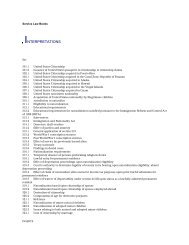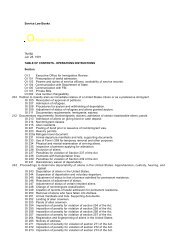Create successful ePaper yourself
Turn your PDF publications into a flip-book with our unique Google optimized e-Paper software.
<strong>Inspector's</strong> <strong>Field</strong> <strong>Manual</strong><br />
authorization number, for example: "97-MIA-(E)-001."<br />
Unusual delays or other discrepancies in the performance of an en route inspection shall be documented in<br />
writing in memorandum form to the appropriate regional office. Any corrective actions proposed or taken by<br />
managerial personnel shall also be referenced by memorandum.<br />
(6) Commencement of en route inspection. Service officers are prohibited from commencement of the<br />
inspection until the vessel is actually en route, i.e., free from moorings and under its own power<br />
(7) Program monitoring. District directors shall institute local procedures for monitoring the conduct<br />
of en route inspections. Officers conducting such inspections shall be given periodic refresher training on the<br />
ethical standards which employees must uphold in the performance of their official duties. Instruction on the<br />
standard schedule of disciplinary offenses and penalties for employees shall be included in this refresher<br />
training. The importance of the role which local supervisors and managers play in the maintenance of ethical<br />
standards, bot their own and that of their subordinates, shall also be emphasized. Local procedures shall be<br />
established to closely monitor en route inspection activity. These procedures shall be designed to facilitate early<br />
detection of procedural improprieties and prohibited practices. Procedures used to achieve these goals include<br />
the initiation of locally designed monitoring activities and procedures as well as information-sharing liaison<br />
activities between Service officials and cruise ship line representatives. A positive public relations posture<br />
regarding these issues is a responsibility of all local supervisors and managers.<br />
First-line supervisors play a vital role in assuring that en route inspections are conducted in a cost effective<br />
manner. Information relating to assigned work schedules, actual hours worked, the numbers of passengers and<br />
crew inspected and the most cost efficient use of salary and overtime resources should be retained by each<br />
district and provided to Headquarters and regional officials upon request. This information should also be<br />
considered when making en route assignments and monitoring such activities.<br />
Inquiries shall be conducted in all instances in which management personnel become aware of noncompliance<br />
with en route inspection policies and procedures. Such inquiries shall be conducted by one or more management<br />
officials who are at least one managerial level above the managerial official who authorized the inspection.<br />
Written inquiry results shall be forwarded, through channels, to the district director. In situations where such<br />
inquiry reveals that Service policy has been violated, district directors shall institute appropriate corrective<br />
action, including disciplinary action, if warranted.<br />
Regional offices shall promptly be notified of all instances of noncompliance. These offices shall also be<br />
apprised of corrective or disciplinary actions proposed or taken with respect to such incidents. Unusual<br />
circumstances affecting the conduct of en route inspections, such as those which would attract media attention or<br />
congressional interest should be reported promptly.<br />
(8) Presence of family members on en route inspections. It is prohibited, pursuant to 18 U.S.C.<br />
201(c)(1)(B), for accompanying family member or friends of INS officers conducting en route inspections to<br />
travel with the employee either for free or at a substantially discounted fare not available to the general public.<br />
Such fares constitute benefits of value, which would not be received, were it not for the position and authority of<br />
the officer to inspect passengers and crew. Further, 5 CFR 2635.202(a)(2) states that employees shall not, directly<br />
or indirectly, solicit or accept a gift because of the employees official position. Also, 5 CFR 2635.502(a) prohibits<br />
employees of the federal government from participating in a matter which would cause a reasonable person to<br />
question such employees' impartiality.<br />
23.2 Exceptions to Inspection Requirements.<br />
(a) General. Statute requires the inspection of every arriving passenger and crewmember upon arrival in the<br />
United States. See section 235 of the Act and 8 CFR 235.1. Service policy interpretation provides some<br />
clarification regarding persons whose comings to the U.S. are not treated as "arrivals," thereby not requiring<br />
inspection. Service policy excludes the following from the ordinary inspectional procedures:<br />
(1) Any person, including an alien crewman, passing through the Panama Canal on board a vessel<br />
which enters and clears at the Canal port only to transit, refuel, or to land passengers or crewmen for medical<br />
treatment, shall not be regarded as coming from a foreign port solely by reason of such passage;




